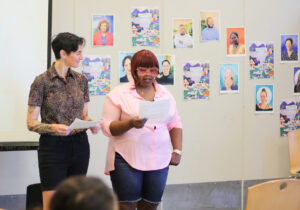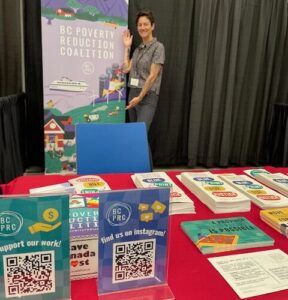By Sumaiya Tufail – October 18, 2024
How did you get involved with the BC Poverty Reduction Coalition?

Provincial Director, BC Poverty Reduction Coalition
I’ve been the director for three years, but my background is in frontline work, including shelter housing and harm reduction in the Downtown East Side and other nonprofit spaces. I got involved as someone with lived experience with disability—I have type 1 diabetes and have advocated for insulin to be covered by Pharmacare. For many of us, access to essential medication is tied to employment benefits, and that’s unacceptable. My experience has shown me firsthand how inadequate the social system is, especially for those with chronic illnesses.
I want to highlight key poverty reduction measures like affordable childcare, food security, paid sick time, migrant rights, and free transit. Precarity creates the conditions for poverty to thrive, so these issues are deeply interconnected.
Can you tell us about the BC Poverty Reduction Coalition’s current projects addressing job precarity?
We’re currently working on three key election campaigns launching this fall: free transit for youth under 18, affordable housing, and raising income assistance and disability rates. Right now, assistance rates are well below the poverty line, trapping people in cycles of enforced poverty. We need interventions that break this cycle, starting with providing safe, affordable housing and access to transit so people can meet their basic needs.
In addition, we’re analyzing the provincial government’s new five-year poverty reduction plan, produced in collaboration with the CCPA and the Living Wage Campaign. Here is our response to the plan in our current article, which outlines recommendations for reducing poverty in BC: https://www.policynote.ca/poverty-reportcard/
 How is the BC Poverty Reduction Coalition collaborating with other organizations to address job precarity?
How is the BC Poverty Reduction Coalition collaborating with other organizations to address job precarity?
Collaboration is central to our work as a coalition. Our strength lies in the collective impact we achieve by bringing together various organizations. A policy recommendation supported by multiple groups carries much more weight than if it’s coming from just one. Through the UP-BC project, we can connect with our members, combining research with frontline realities.
We also involve the lived experience of poverty through our Community Action Network, a network of people with lived experience of poverty, which often propose the most effective solutions. This holistic approach is grounded in grassroots activism, lobbying, and research.
“Having properly funded disability and income assistance programs would mean an end to standing in line at food banks, forced to choose between paying bills or buying groceries. Social assistance rates that meet and keep pace with the poverty line would allow people a sense of security, knowing they won’t face eviction. A decent safety net will allow everyone to make choices.”
– From Disability Without Poverty.

Are there any upcoming initiatives related to job precarity that readers should know about?
Yes! Visit our website and check out our campaigns page. We have an action postcard campaign where you can send a postcard to party leaders, urging them to support affordable housing, expanding robust public transit systems, and raising disability rates. It’s a simple but powerful way to get involved.

 How is the BC Poverty Reduction Coalition collaborating with other organizations to address job precarity?
How is the BC Poverty Reduction Coalition collaborating with other organizations to address job precarity?